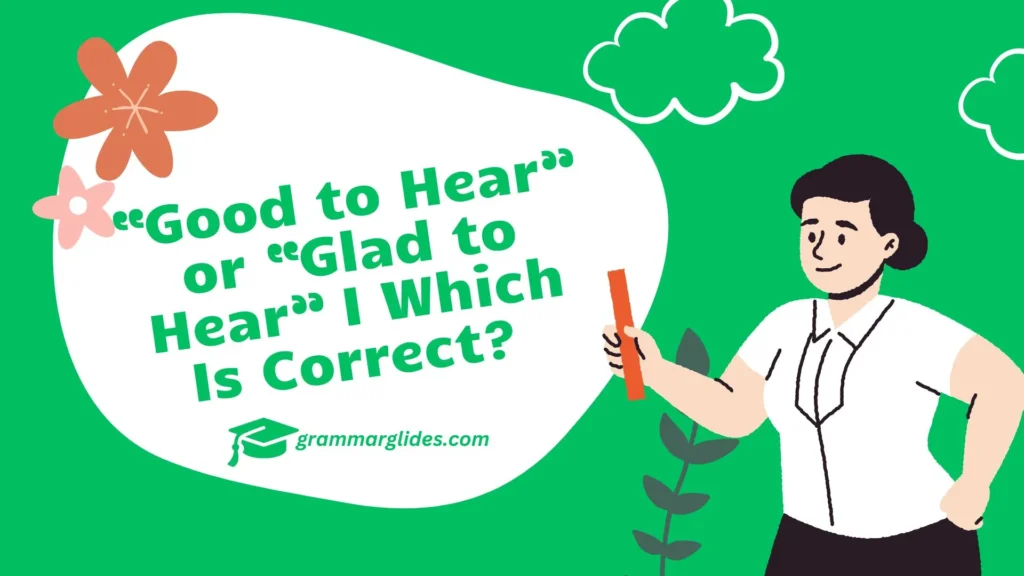“Choosing between “Good to Hear” and “Glad to Hear” can elevate your communication style – learn the nuances to master their usage.”
The English language is full of phrases that can convey positivity and warmth. Among them, “Good to Hear” and “Glad to Hear” often stand out in both casual and professional settings. While these phrases seem interchangeable, they carry subtle differences that can shape the tone of your message. Understanding their distinctions can help you use them effectively in various contexts.
In your daily conversations or professional emails, selecting the right phrase can make your communication more precise and relatable. This blog will guide you through their meanings, usage, and the situations in which one is better than the other.
If you’ve ever hesitated about when to say “Good to Hear” or “Glad to Hear,” this article will provide clarity. We’ll dive into their emotional tones, levels of formality, and even cultural preferences, ensuring you use the correct phrase with confidence.
Overview of “Good to Hear” or “Glad to Hear”
“Good to hear” and “glad to hear” are phrases commonly used to express a positive reaction to news, updates, or statements. While both convey similar sentiments of happiness or approval, “glad to hear” often carries a slightly more personal or heartfelt tone, reflecting genuine warmth.
On the other hand, “good to hear” tends to be neutral and professional, making it suitable for formal or casual conversations. Understanding the context and relationship with the listener can help you decide which phrase to use for clear and appropriate communication.
Understanding “Good to Hear”
Definition and Usage
“Good to Hear” is a versatile phrase often used to acknowledge positive news or updates. It conveys a mild level of appreciation or approval without being overly personal or emotional.
For example:
- “That the project is back on track is good to hear.”
- “Good to hear that your flight landed safely.”
- “It’s good to hear the event was a success.”
This phrase is commonly employed in professional settings or conversations where neutrality is preferred.
Scenarios and Examples
- Workplace Update: Imagine your colleague shares that they completed a crucial task. You might respond with, “Good to hear that you managed to meet the deadline.”
- General News: If someone tells you they are feeling better after being unwell, you could say, “Good to hear that you’re recovering well.”
- Professional Feedback: When a client appreciates your service, you might reply, “Good to hear that our efforts met your expectations.”
Understanding “Glad to Hear”

Definition and Usage
“Glad to Hear” is a more personal and expressive phrase, often used to convey genuine happiness about someone’s positive news. It reflects a warmer emotional tone, making it suitable for close relationships.
For example:
- “I’m glad to hear you got the promotion!”
- “Glad to hear that your vacation was relaxing.”
- “So glad to hear about the good results!”
This phrase is common in informal settings where emotional connections are emphasized.
Scenarios and Examples
- Personal Achievement: Your friend announces they’ve won an award. You might respond, “I’m so glad to hear that! You deserve it.”
- Health Update: If a family member is recovering, you could say, “Glad to hear you’re feeling much better!”
- Celebration: When someone shares their engagement news, you might exclaim, “Glad to hear about your engagement—congratulations!”
Key Differences Between the Two Phrases
Emotional Tone
- “Good to Hear”: Neutral and professional, conveying acknowledgment without deep emotional involvement.
- “Glad to Hear”: Personal and warm, expressing genuine happiness for someone’s situation.
Formality Levels
- “Good to Hear”: Preferred in formal or professional settings.
- “Glad to Hear”: More suitable for casual or informal conversations.
Personal vs. Impersonal
- “Good to Hear”: Works well in impersonal or distant relationships.
- “Glad to Hear”: Ideal for closer, more personal relationships.
When to Use Each Phrase
Appropriate Situations
- “Good to Hear”:

- Business meetings or emails.
- Neutral responses to updates.
- Acknowledging success without emotional depth.
- “Glad to Hear”:
- Celebratory moments.
- Personal connections.
- Expressing heartfelt appreciation.
Professional Communication
In professional environments, “Good to Hear” is often more appropriate as it maintains a formal tone. For example:
- “Good to hear the quarterly targets were achieved.”
- “It’s good to hear the client is satisfied with the proposal.”
Social Communication
For social interactions, “Glad to Hear” adds a touch of warmth:
- “So glad to hear you’re visiting us soon!”
- “Glad to hear you had a great trip!”
Aunty or Auntie – Which One Is Correct?
Common Mistakes and Misconceptions
Incorrect Usage
- Overusing “Good to Hear” in personal contexts can make you seem detached.
- Incorrect: “Good to hear you got engaged.”
- Correct: “Glad to hear about your engagement!”
- Using “Glad to Hear” in formal emails can appear overly casual.
- Incorrect: “Glad to hear the project is complete.”
- Correct: “Good to hear the project is complete.”
Misconceptions
- Interchangeability: While similar, these phrases are not always interchangeable due to their emotional tone and context.
- Formality: Some assume “Glad to Hear” is acceptable in all settings, which is not the case.
Regional and Cultural Variations
Regional Preferences
- In the U.S. and Canada, “Glad to Hear” is common in friendly conversations, while “Good to Hear” dominates professional settings.
- In the U.K., both phrases are used, but “Good to Hear” leans more toward formal contexts.
Cultural Considerations
- Some cultures prefer less expressive phrases in professional contexts, making “Good to Hear” the safer option.
- Warm cultures might lean toward “Glad to Hear” even in semi-formal interactions.
Practical Tips for Choosing the Right Phrase
Guidelines
- Consider the context: Professional or personal?
- Assess the relationship: Is it formal or casual?
- Match the emotional tone: Neutral or expressive?
Examples
- Workplace: “Good to hear the presentation went smoothly.”
- Friends: “Glad to hear you’re enjoying your new job!”
- Mixed Context: “It’s good to hear everyone had a great time at the event.”
Key Insight
- Can I use “Glad to Hear” in emails?
Yes, but only if the email is informal or the recipient has a friendly rapport with you. - Is “Good to Hear” too impersonal for friends?
It can be, so use “Glad to Hear” for closer connections. - Are these phrases interchangeable?
Not always. Choose based on tone, formality, and context. - What’s a synonym for “Good to Hear”?
“Nice to know” is a common alternative in neutral contexts. - Can I combine both phrases?
Combining them is rare but possible, e.g., “It’s good to hear, and I’m glad to hear it!”
Wrap-Up
Selecting the correct phrase—“Good to Hear” or “Glad to Hear”—can make a significant difference in how your message is received. Understanding their nuances ensures your communication is appropriate, whether in professional emails or heartfelt conversations with loved ones. While “Good to Hear” suits formal contexts, “Glad to Hear” adds warmth to personal exchanges. Mastering their usage allows you to express yourself confidently and effectively, avoiding common pitfalls while respecting cultural variations.
In every interaction, let the tone and relationship guide your choice. This way, your words will always strike the right note, making your message clear, respectful, and engaging.

Hi! I’m Zadie-Smith, the author of Grammar Glides. I create easy-to-follow resources to help you master English grammar with confidence. Join me on my website for tips and tools to make your English learning journey smooth and enjoyable!

